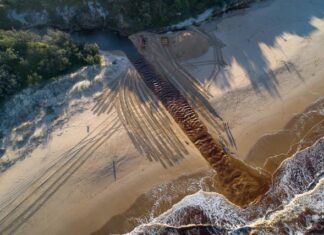By JOLENE OGLE
COMMERCIAL fishermen have reported a barrage of daily abuse as the push to ban net fishing on Noosa’s North Shore heats up.
Tracey Eardley has fished for most of her life and turned to commercial net fishing almost 18 years ago when she bought her licence.
Since then, she has enjoyed a steady income from what she describes as hard, but enjoyable, work. But recently, with the Fisheries review of commercial fishing underway, Ms Eardley said she has faced daily abuse on the beach.
“I went to work last week, I went to Fraser, just me and another man … we had the net, and I was out of the truck and these cars came past, three of them,” she said.
Ms Eardley said the drivers of the cars all swore at her and yelled abuse as they drove past. She described the incident as terrifying and said she was glad none of the cars stopped.
Richard Brown from Markwell Fisheries, a fishery wholesaler who has bought Tracey’s fish stock for many years, said he believes the abuse stems from a lack of understanding of the commercial fishing industry.
“People like Tracey are self-employed, hard-working people, who are feeding us,” he said.
“Why on earth are people turning around and abusing them?
“They fish mullet, which is a seasonal fish that lasts six to eight weeks and isn’t caught on a line. Of the mullet stock caught, it is all used. We buy it.”
Mr Brown said previous stories of fish being used for cat food are “rubbish”, with fish heads usually re-used as bait.
“If stock is damaged or bruised, we still buy it but the fisherman gets a lower price than if the stock was in good condition,” he said.
Mr Brown said removing the commercial net fishermen from Noosa North Shore will set a “dangerous precedent” and leave many local families without jobs.
“Why are we trying to stop something that isn’t broken,” he said.
To work towards a healthy environment it was important to shift the focus from banning commercial fishing to maintaining the local waterways, Mr Brown said.
“The issue isn’t about what’s happening out in the ocean, it’s inshore. If we’re not protecting that, forget about the rest of it,” he said.
“That’s the biggest issue we have … we need to most definitely turn our attention inland.”
Mr Brown’s comments come after the Healthy Waterways report card found a decline in fish stock in Noosa’s freshwater waterways due to a lack of rain and therefore, habitat for fish to breed.
Mr Brown and Ms Eardley said they both share the same concern for the local fishing industry, that a continued push to oust commercial netters will lead to a decline in master fishermen.
“There are no kids being taught (to fish). There are no incentives to come into the industry,” Mr Brown said.
“Why would you come in to cop this sort of flack?”







